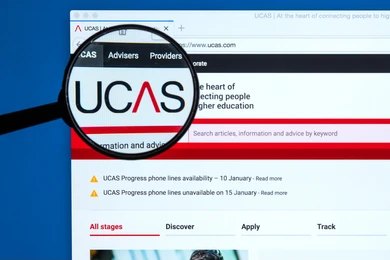For students dreaming of studying at some of the world’s most prestigious universities, the UK remains a top destination. From the historic halls of Oxford and Cambridge to modern research powerhouses like Imperial College London and the University of Edinburgh, UK universities attract thousands of international applicants every year.
If you’re planning to apply, you’ve likely come across the term UCAS — but what exactly is it, and how do you navigate the process successfully?
In this detailed guide by Edu4World, we’ll break down the UCAS application process, offering practical tips and insights that go beyond generic advice. Whether you’re a first-time applicant or supporting someone on this journey, you’ll find everything you need to know right here.
📌 What is UCAS?
UCAS (Universities and Colleges Admissions Service) is the centralized system used to apply to undergraduate courses at most UK universities. Rather than submitting separate applications to each university, you complete one application that’s sent to up to five university programs at once.
👉 Why UCAS matters:
- It standardizes the application process.
- It ensures fairness — universities don’t see your other choices.
- It keeps everything in one place: personal statement, references, and exam details.
💡 Who Needs to Apply Through UCAS?
✅ UK students applying for undergraduate degrees
✅ International students (including from India, Pakistan, UAE, USA, etc.)
✅ EU and EEA students post-Brexit
Even if you’re applying for foundation or integrated Master’s courses, UCAS is usually the route.
🎯 Key Stages of the UCAS Application Process
Let’s break it down so you can plan your application timeline effectively.
1️⃣ Register on UCAS Hub
You’ll start by creating an account on the UCAS Hub — this is your dashboard for managing everything related to your application.
💡 Tip: Register early (usually from May onwards for the following year’s intake) so you can explore options and set reminders.
2️⃣ Choose Your Courses
You can apply to up to five courses — at different universities or even different programs at the same university (except Oxford and Cambridge, where you can apply to only one).
👉 Best practice:
- Research course content, modules, placement options.
- Check entry requirements carefully (A-levels, IB, or equivalent; English language proficiency).
- Consider location, costs, and campus life.
3️⃣ Write Your Personal Statement
This is the most important part of your application that you control.
✅ UCAS personal statement word limit: 4,000 characters (around 500-600 words)
✅ What to include:
- Why you want to study the subject
- Relevant skills, achievements, and experiences
- Evidence of enthusiasm beyond school (reading, volunteering, projects)
- Career aspirations
💡 Tip: Make your personal statement specific enough to show your passion for the subject — but broad enough to appeal to all your chosen courses.
4️⃣ Add Your Education History
You’ll provide details of:
- Your current and completed qualifications
- Predicted grades if you haven’t finished school yet
👉 International students: Ensure your qualifications are correctly named (e.g., CBSE, ISC, IB) and include any official English translations if required.
5️⃣ Add Your Reference
For most students, this is a school counselor or teacher’s recommendation.
👉 Make sure your referee knows you’re applying — and give them plenty of time to write a strong, thoughtful reference.
6️⃣ Pay the Fee and Submit
💰 UCAS fee (2025 entry example):
- £28.50 for multiple choices
- £22.50 for a single choice
Once submitted, your application is sent simultaneously to your chosen universities.
⏰ UCAS Deadlines You Can’t Miss
✅ 15 October — Deadline for Oxford, Cambridge, and most medicine, dentistry, and veterinary science applications
✅ 31 January — Main deadline for most other UK universities
✅ June onwards — UCAS Extra and Clearing open for unplaced applicants
👉 Tip: Don’t wait for deadlines — apply early for the best chance, especially for competitive courses.
💡 Special Tips for International Students
🌎 Check visa requirements early — Your UCAS offer will help with your visa, but start gathering documents ahead of time.
🌎 Prepare for English tests — IELTS, TOEFL, or other approved tests may be required, even if your education was in English.
🌎 Understand fee status — Depending on where you’re from, you may pay “home” or “overseas” fees.
🌎 Look into scholarships and bursaries — Many are open only to early applicants.
📝 What Happens After You Apply?
Once you submit your UCAS application:
✅ Universities review your application individually.
✅ You’ll get responses via UCAS Hub — offers may be:
- Unconditional (you’ve already met conditions)
- Conditional (subject to exam results)
- Unsuccessful
✅ You’ll choose:
- Firm choice (your first choice)
- Insurance choice (backup if firm conditions aren’t met)
🔁 What is UCAS Extra and Clearing?
👉 UCAS Extra — If you don’t hold an offer after your five choices, you can apply for additional courses (Feb–July).
👉 Clearing — For those without a place after results day (July onwards). Many great courses are still available at this stage.
❌ Common UCAS Mistakes to Avoid
⚠ Listing wrong qualifications or grades
⚠ Copying personal statements from the internet (UCAS runs plagiarism checks!)
⚠ Submitting late — universities may already have filled spots
⚠ Failing to research course requirements
💬 FAQs About UCAS Applications
Q: Can I apply directly to a university instead of using UCAS?
👉 Generally no, for undergrad degrees UCAS is required.
Q: How can I make my personal statement stand out?
👉 Focus on your unique motivations, back them with real examples, and avoid clichés.
Q: Can I edit my UCAS application after submitting?
👉 Only limited changes — e.g., address updates. Choose carefully before submitting.
🌟 Final Thoughts: Plan, Prepare, Apply
Applying to UK universities through UCAS may seem complicated at first, but with proper planning, it’s entirely manageable — and a rewarding process.
At Edu4World, we guide students every step of the way:
✅ Course selection
✅ Personal statement drafting
✅ Application review
✅ Scholarship and visa advice
👉 Ready to apply to your dream UK university? Contact Edu4World today — let’s make it happen!









